外研版九年级上Module 1 Wonders of the world Unit 3 教案
文档属性
| 名称 | 外研版九年级上Module 1 Wonders of the world Unit 3 教案 |
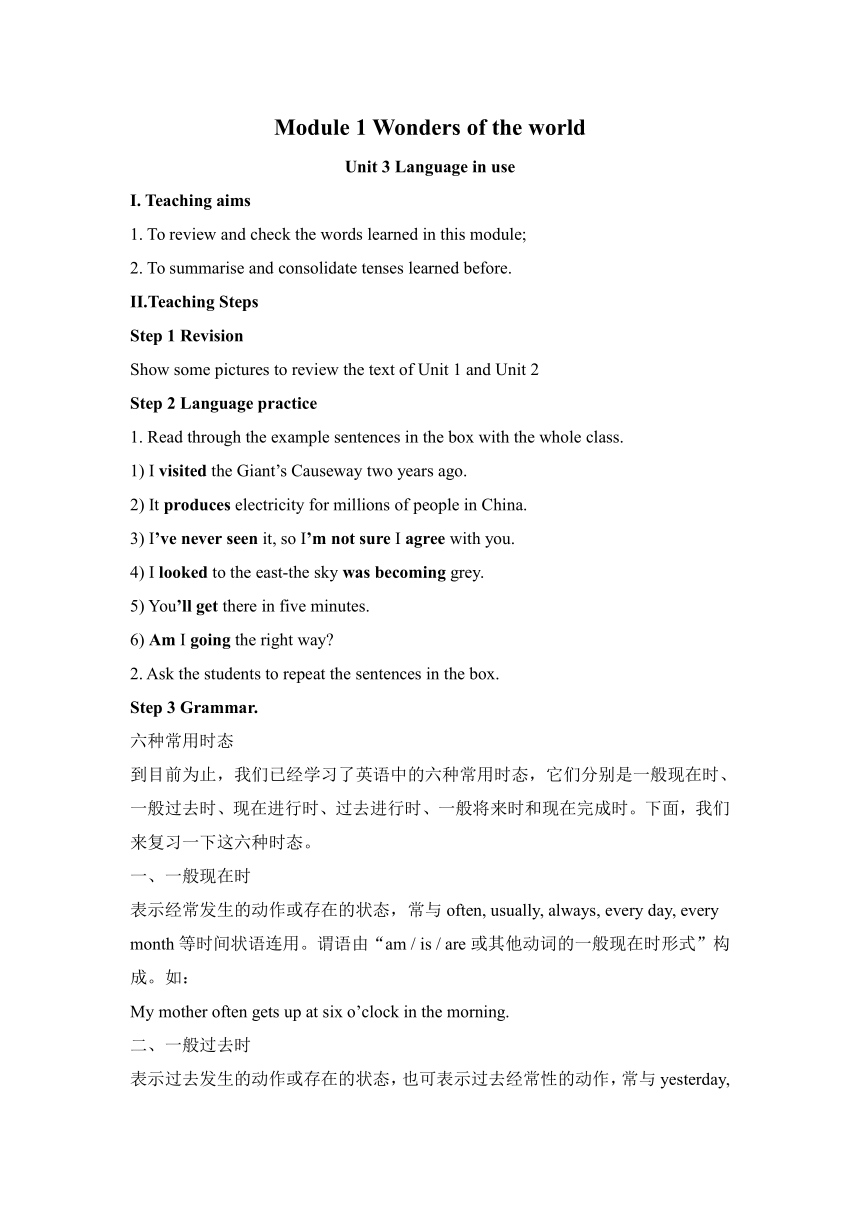
|
|
| 格式 | docx | ||
| 文件大小 | 196.8KB | ||
| 资源类型 | 教案 | ||
| 版本资源 | 外研版 | ||
| 科目 | 英语 | ||
| 更新时间 | 2022-09-06 10:07:05 | ||
图片预览

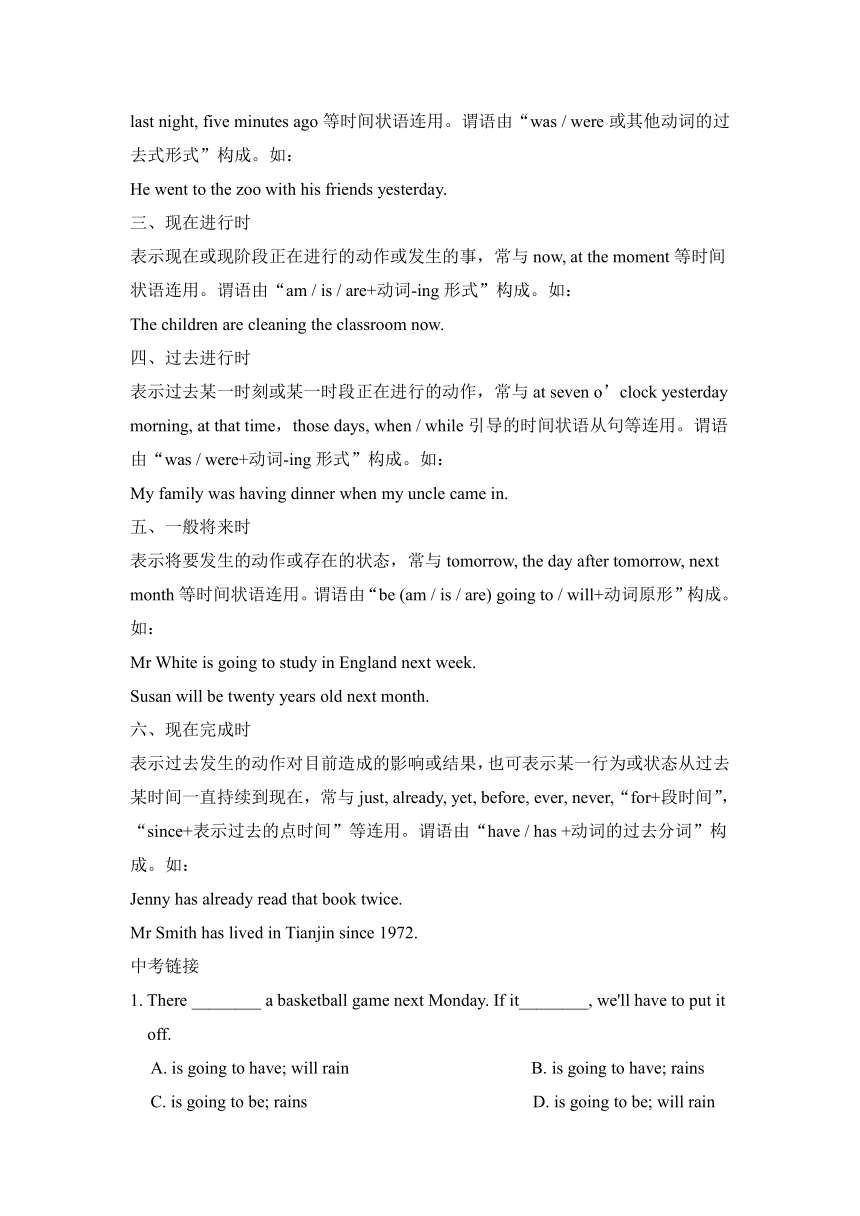
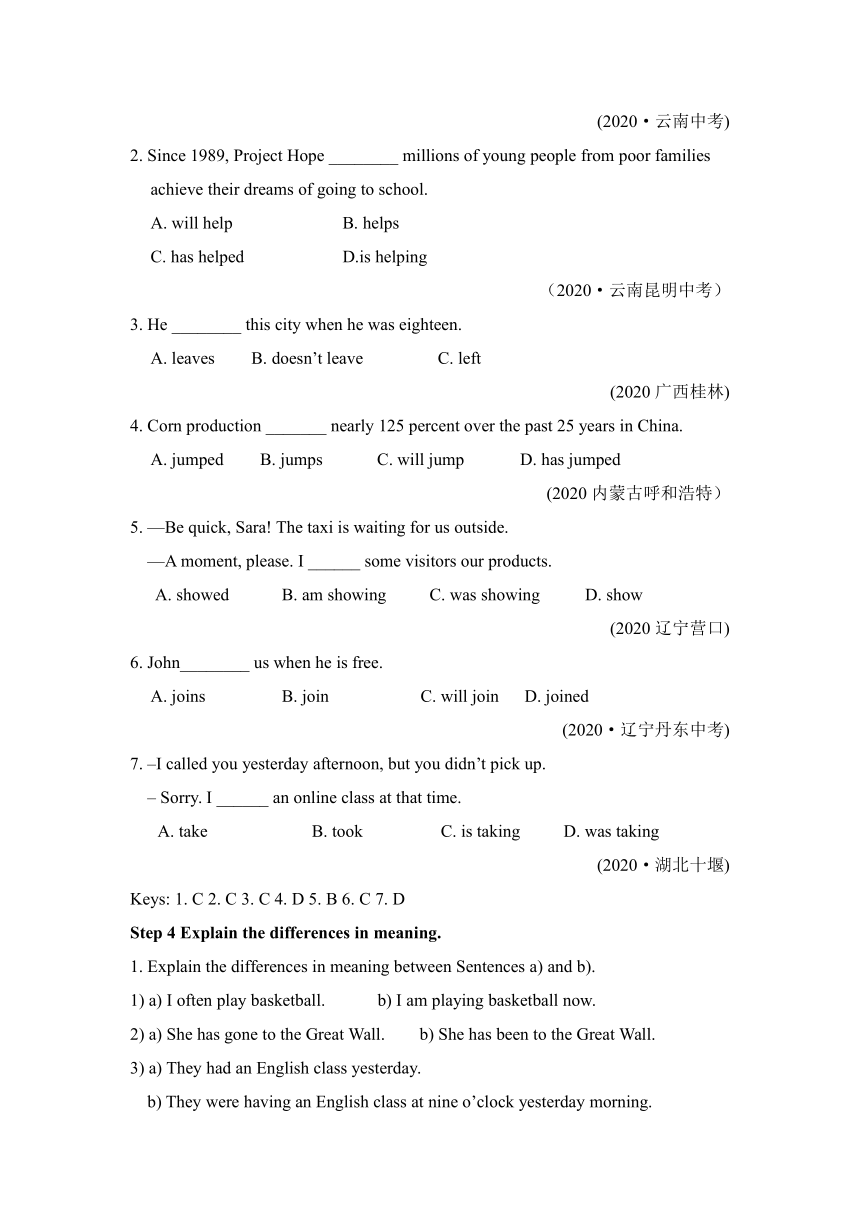
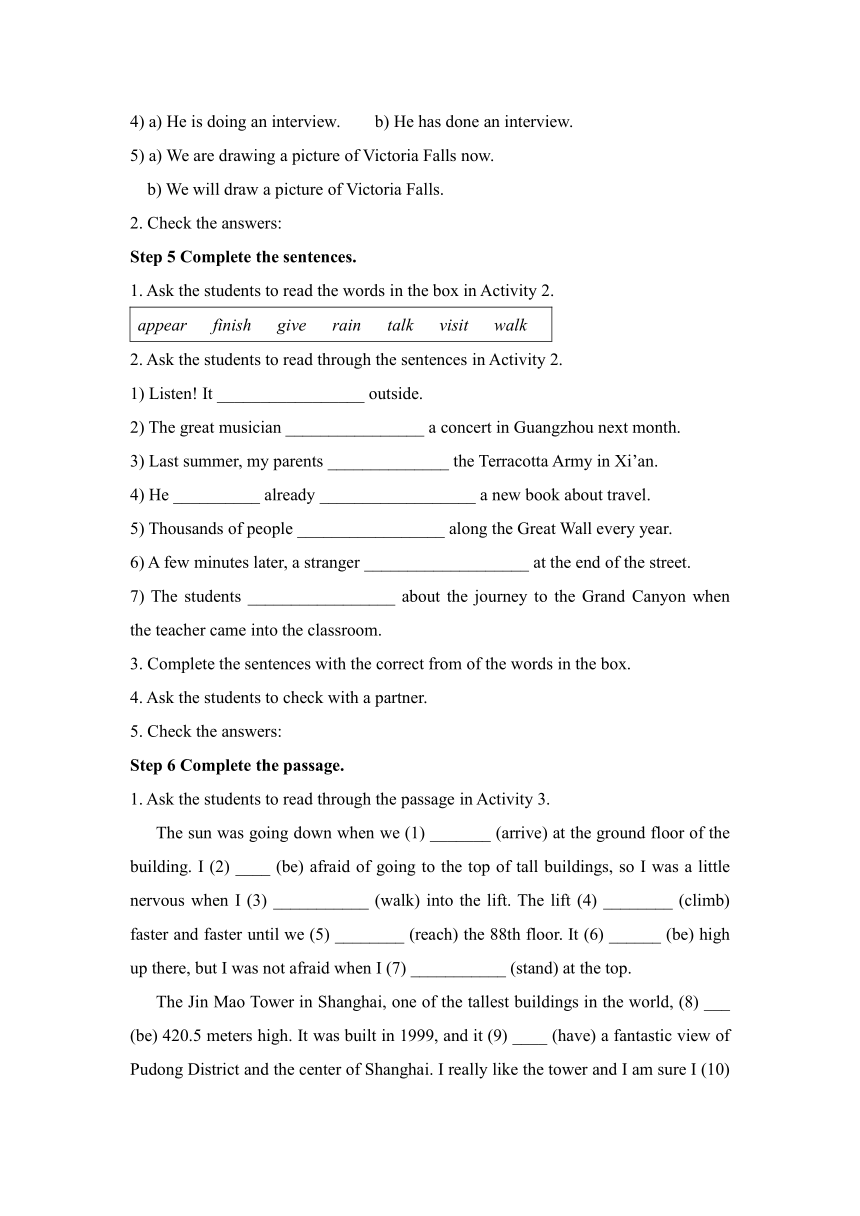
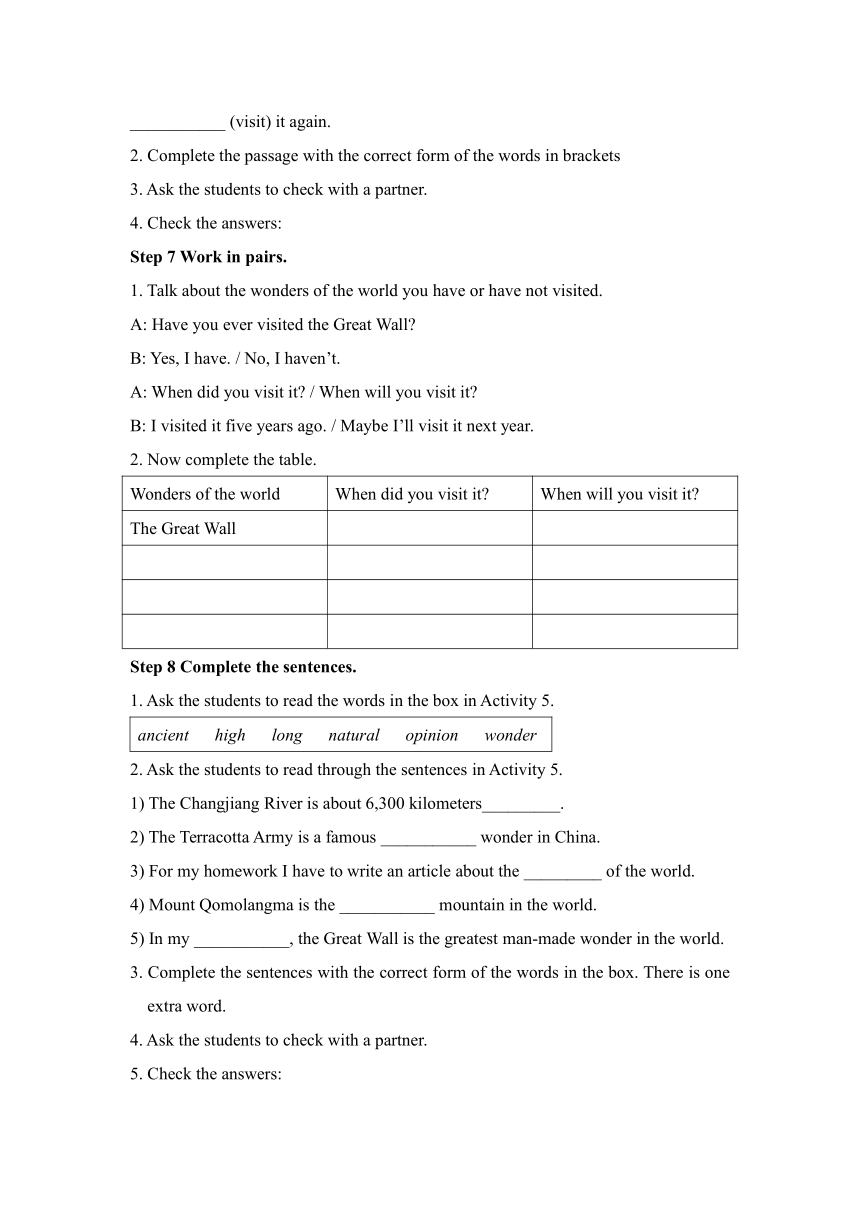
文档简介
Module 1 Wonders of the world
Unit 3 Language in use
I. Teaching aims
1. To review and check the words learned in this module;
2. To summarise and consolidate tenses learned before.
II.Teaching Steps
Step 1 Revision
Show some pictures to review the text of Unit 1 and Unit 2
Step 2 Language practice
1. Read through the example sentences in the box with the whole class.
1) I visited the Giant’s Causeway two years ago.
2) It produces electricity for millions of people in China.
3) I’ve never seen it, so I’m not sure I agree with you.
4) I looked to the east-the sky was becoming grey.
5) You’ll get there in five minutes.
6) Am I going the right way
2. Ask the students to repeat the sentences in the box.
Step 3 Grammar.
六种常用时态
到目前为止,我们已经学习了英语中的六种常用时态,它们分别是一般现在时、一般过去时、现在进行时、过去进行时、一般将来时和现在完成时。下面,我们来复习一下这六种时态。
一、一般现在时
表示经常发生的动作或存在的状态,常与often, usually, always, every day, every month等时间状语连用。谓语由“am / is / are或其他动词的一般现在时形式”构成。如:
My mother often gets up at six o’clock in the morning.
二、一般过去时
表示过去发生的动作或存在的状态,也可表示过去经常性的动作,常与yesterday, last night, five minutes ago等时间状语连用。谓语由“was / were或其他动词的过去式形式”构成。如:
He went to the zoo with his friends yesterday.
三、现在进行时
表示现在或现阶段正在进行的动作或发生的事,常与now, at the moment等时间状语连用。谓语由“am / is / are+动词-ing形式”构成。如:
The children are cleaning the classroom now.
四、过去进行时
表示过去某一时刻或某一时段正在进行的动作,常与at seven o’clock yesterday morning, at that time,those days, when / while引导的时间状语从句等连用。谓语由“was / were+动词-ing形式”构成。如:
My family was having dinner when my uncle came in.
五、一般将来时
表示将要发生的动作或存在的状态,常与tomorrow, the day after tomorrow, next month等时间状语连用。谓语由“be (am / is / are) going to / will+动词原形”构成。如:
Mr White is going to study in England next week.
Susan will be twenty years old next month.
六、现在完成时
表示过去发生的动作对目前造成的影响或结果,也可表示某一行为或状态从过去某时间一直持续到现在,常与just, already, yet, before, ever, never,“for+段时间”,“since+表示过去的点时间”等连用。谓语由“have / has +动词的过去分词”构成。如:
Jenny has already read that book twice.
Mr Smith has lived in Tianjin since 1972.
中考链接
1. There ________ a basketball game next Monday. If it________, we'll have to put it off.
A. is going to have; will rain B. is going to have; rains
C. is going to be; rains D. is going to be; will rain
(2020·云南中考)
2. Since 1989, Project Hope ________ millions of young people from poor families achieve their dreams of going to school.
A. will help B. helps
C. has helped D.is helping
(2020·云南昆明中考)
3. He ________ this city when he was eighteen.
A. leaves B. doesn’t leave C. left
(2020广西桂林)
4. Corn production _______ nearly 125 percent over the past 25 years in China.
A. jumped B. jumps C. will jump D. has jumped
(2020内蒙古呼和浩特)
5. —Be quick, Sara! The taxi is waiting for us outside.
—A moment, please. I ______ some visitors our products.
A. showed B. am showing C. was showing D. show
(2020辽宁营口)
6. John________ us when he is free.
A. joins B. join C. will join D. joined
(2020·辽宁丹东中考)
7. –I called you yesterday afternoon, but you didn’t pick up.
– Sorry. I ______ an online class at that time.
A. take B. took C. is taking D. was taking
(2020·湖北十堰)
Keys: 1. C 2. C 3. C 4. D 5. B 6. C 7. D
Step 4 Explain the differences in meaning.
1. Explain the differences in meaning between Sentences a) and b).
1) a) I often play basketball. b) I am playing basketball now.
2) a) She has gone to the Great Wall. b) She has been to the Great Wall.
3) a) They had an English class yesterday.
b) They were having an English class at nine o’clock yesterday morning.
4) a) He is doing an interview. b) He has done an interview.
5) a) We are drawing a picture of Victoria Falls now.
b) We will draw a picture of Victoria Falls.
2. Check the answers:
Step 5 Complete the sentences.
1. Ask the students to read the words in the box in Activity 2.
appear finish give rain talk visit walk
2. Ask the students to read through the sentences in Activity 2.
1) Listen! It _________________ outside.
2) The great musician ________________ a concert in Guangzhou next month.
3) Last summer, my parents ______________ the Terracotta Army in Xi’an.
4) He __________ already __________________ a new book about travel.
5) Thousands of people _________________ along the Great Wall every year.
6) A few minutes later, a stranger ___________________ at the end of the street.
7) The students _________________ about the journey to the Grand Canyon when the teacher came into the classroom.
3. Complete the sentences with the correct from of the words in the box.
4. Ask the students to check with a partner.
5. Check the answers:
Step 6 Complete the passage.
1. Ask the students to read through the passage in Activity 3.
The sun was going down when we (1) _______ (arrive) at the ground floor of the building. I (2) ____ (be) afraid of going to the top of tall buildings, so I was a little nervous when I (3) ___________ (walk) into the lift. The lift (4) ________ (climb) faster and faster until we (5) ________ (reach) the 88th floor. It (6) ______ (be) high up there, but I was not afraid when I (7) ___________ (stand) at the top.
The Jin Mao Tower in Shanghai, one of the tallest buildings in the world, (8) ___ (be) 420.5 meters high. It was built in 1999, and it (9) ____ (have) a fantastic view of Pudong District and the center of Shanghai. I really like the tower and I am sure I (10) ___________ (visit) it again.
2. Complete the passage with the correct form of the words in brackets
3. Ask the students to check with a partner.
4. Check the answers:
Step 7 Work in pairs.
1. Talk about the wonders of the world you have or have not visited.
A: Have you ever visited the Great Wall
B: Yes, I have. / No, I haven’t.
A: When did you visit it / When will you visit it
B: I visited it five years ago. / Maybe I’ll visit it next year.
2. Now complete the table.
Wonders of the world When did you visit it When will you visit it
The Great Wall
Step 8 Complete the sentences.
1. Ask the students to read the words in the box in Activity 5.
ancient high long natural opinion wonder
2. Ask the students to read through the sentences in Activity 5.
1) The Changjiang River is about 6,300 kilometers_________.
2) The Terracotta Army is a famous ___________ wonder in China.
3) For my homework I have to write an article about the _________ of the world.
4) Mount Qomolangma is the ___________ mountain in the world.
5) In my ___________, the Great Wall is the greatest man-made wonder in the world.
3. Complete the sentences with the correct form of the words in the box. There is one extra word.
4. Ask the students to check with a partner.
5. Check the answers:
Step 9 Complete the passage.
1. Introduce background of the Louvre Museum to the students.
2. Ask the students to read the words in the box in Activity 6.
agree with at the bottom of go through looking forward to millions of more than
3. Ask the students to read through the passage in Activity 6.
I’m really (1) ______________ my visit to the Louvre Museum in Paris. It’s the most visited museum in the world-every year, (2) ______________ people visit it. The Louvre is in an old building, but to get inside you must (3) ______________ a giant glass pyramid that is (4) ______________ 20 metres tall. The entrance to the museum is (5) ______________ the pyramid. Some people do not like the glass pyramid. They say it looks too new and does not suit the older buildings. I do not (6) ______________ them. I think it looks great.
3. Complete the passage with the expressions in the box
4. Ask the students to check with a partner.
5. Check the answers:
Step 10 Listening practice.
A. Listen and number the pictures.
1. Ask the students to look at the pictures in Activity 7 individually.
2. Play the tape.
3. Listen and choose the correct answer.
4. Ask the students to check with a partner.
5. Check the answers:
B. Listen again and complete the table.
1. Ask the students to read the information in the table in Activity 8.
Mount Qomolangma The Empire State Building The Great Pyramid at Giza
Location Between China and Nepal. _______________. In Egypt.
Height __________metres. _________ metres. About __________ metres now.
Interesting facts First people to climb to the top: Sir Edmund Hillary and Tenzing Norgay. ____________ floors. About ___________ years old.
2. Play the tape.
3. Listen and choose the correct answer.
4. Ask the students to check with a partner.
5. Check the answers:
Step 11 Work in pairs.
Think about three other wonders of the world and talk about them.
A: Where is …
B: It’s…
A: How high is it
B: It’s …metres high.
Step 12 Around the world:
Stonehenge: A man-made wonder of the world
1. Ask the students to look at the picture and discuss what they can see.
2. Read through the information with the whole class.
Stonehenge: A man-made wonder of the world
Stonehenge is an ancient circle of stones in the south of England. It is about 5,000 years ago. It was probably a place to bury dead people or a place to study the stars and the sky at night.
There are dozens of stones, and they are different in height. The stones came from about 200 kilometres away. Some of the stones are missing, but it's still one of the most wonderful sights of the world. It is a wonder also because of this question: How did ancient people move these huge stones without machines to help them No one knows the answer
3. Fill in the blanks.
Shape: (1) _____
Location: in (2) ___________ England
History: about 5,000 years
Details about stones:
There are dozens of stones, and they are (3) __________ in height.
They came from about (4) ________________ away.
Possible usage:
A place to (5) ________________ or study the stars and the sky at night.
4. Ask the students to check with a partner.
5. Check the answers:
6. Read the passage together.
Step 13 Module task: Making a poster about a wonder of the world
A. Work in groups of four. Make a poster about a wonder of the world.
1. Decide on the wonder of the world for your poster.
2. Find out as much information as you can in books and on websites. Think about:
1) Why should people visit the wonder
2) What will people see there
3) How can people get there
4) How much does it cost to visit the wonder
5) When is the best time to visit the wonder
3. Make a poster. Find some pictures showing the wonder.
B. Present your poster to the class.
Step 14 Exercises
Ⅰ. 根据语境及括号内所给动词提示用适当的时态填空。
1. My father ________ (come) back home in an hour.
2. I ________ (watch) TV when Danny came to visit me.
3. —Hello. Is Li Hai at home
—No. He ________ (go) to the park.
4. Mrs Zhang ________ (read) in her bedroom at the moment.
5. Our English teacher usually ________ (take) a bus to school.
6. My father ________ (buy) a blue car three days ago.
7. Ever since then, my uncle ________ (work) in the company.
8. Mr Black ________ (play) basketball at this time yesterday.
9. So far Tony ________ (see) the movie a few times.
10. Mike ________ (win) the tennis match last Sunday.
Ⅱ. 根据括号内所给英文提示语将下列句子翻译成英语。
1. 他们去过苏州和南京。 (have been to)
_________________________________
2. 她害怕单独呆在家。 (be afraid of)
_________________________________
3. 课堂上你必须认真听老师讲课。 (have to)
_________________________________
4. 我们学校在这条马路的尽头。 (at the end of)
_________________________________
5. 我在期待着你的新书。 (look forward to)
_________________________________
Ⅲ. 根据材料内容,从方框中选择恰当的单词填空,使材料意思完整、通顺,有的需要变换形式,每词限用一次。
if, build, city, cost, year, near, large, power
Have you heard of the Three Gorges Dam It's a great wonder in Hubei. It's one of the (1) ________ dams in the world. The workers began to (2) ________ it in 1994 and it took about twelve (3) ________ to finish it. Because the dam is really large, it (4) ________ a lot of money.
The Three Gorges Dam was built for (5) ________ and flood control (防洪). It protects some large (6) ________, such as Wuhan, Nanjing and Shanghai. It also protects many farms, small villages, towns and factories (工厂) (7) ________ the Changjiang River.
(8) ________ you visit the Three Gorges Dam, you will be surprised at it!
Keys:
Ⅰ. 1. will come 2. was watching 3. has gone 4. is reading 5. takes 6. bought
7. has worked 8. was playing 9. has seen 10. won
Ⅱ. 1. They have been to Suzhou and Nanjing.
2. She's afraid of staying at home alone.
3. You have to listen to the teachers carefully in class.
4. Our school is at the end of this road.
5. I'm looking forward to your new book.
Ⅲ. 1. largest 2. build 3. years 4. cost 5. power 6. cities 7. near 8. If
Step 15 Homework
Make a poster and present your poster to the class.
Unit 3 Language in use
I. Teaching aims
1. To review and check the words learned in this module;
2. To summarise and consolidate tenses learned before.
II.Teaching Steps
Step 1 Revision
Show some pictures to review the text of Unit 1 and Unit 2
Step 2 Language practice
1. Read through the example sentences in the box with the whole class.
1) I visited the Giant’s Causeway two years ago.
2) It produces electricity for millions of people in China.
3) I’ve never seen it, so I’m not sure I agree with you.
4) I looked to the east-the sky was becoming grey.
5) You’ll get there in five minutes.
6) Am I going the right way
2. Ask the students to repeat the sentences in the box.
Step 3 Grammar.
六种常用时态
到目前为止,我们已经学习了英语中的六种常用时态,它们分别是一般现在时、一般过去时、现在进行时、过去进行时、一般将来时和现在完成时。下面,我们来复习一下这六种时态。
一、一般现在时
表示经常发生的动作或存在的状态,常与often, usually, always, every day, every month等时间状语连用。谓语由“am / is / are或其他动词的一般现在时形式”构成。如:
My mother often gets up at six o’clock in the morning.
二、一般过去时
表示过去发生的动作或存在的状态,也可表示过去经常性的动作,常与yesterday, last night, five minutes ago等时间状语连用。谓语由“was / were或其他动词的过去式形式”构成。如:
He went to the zoo with his friends yesterday.
三、现在进行时
表示现在或现阶段正在进行的动作或发生的事,常与now, at the moment等时间状语连用。谓语由“am / is / are+动词-ing形式”构成。如:
The children are cleaning the classroom now.
四、过去进行时
表示过去某一时刻或某一时段正在进行的动作,常与at seven o’clock yesterday morning, at that time,those days, when / while引导的时间状语从句等连用。谓语由“was / were+动词-ing形式”构成。如:
My family was having dinner when my uncle came in.
五、一般将来时
表示将要发生的动作或存在的状态,常与tomorrow, the day after tomorrow, next month等时间状语连用。谓语由“be (am / is / are) going to / will+动词原形”构成。如:
Mr White is going to study in England next week.
Susan will be twenty years old next month.
六、现在完成时
表示过去发生的动作对目前造成的影响或结果,也可表示某一行为或状态从过去某时间一直持续到现在,常与just, already, yet, before, ever, never,“for+段时间”,“since+表示过去的点时间”等连用。谓语由“have / has +动词的过去分词”构成。如:
Jenny has already read that book twice.
Mr Smith has lived in Tianjin since 1972.
中考链接
1. There ________ a basketball game next Monday. If it________, we'll have to put it off.
A. is going to have; will rain B. is going to have; rains
C. is going to be; rains D. is going to be; will rain
(2020·云南中考)
2. Since 1989, Project Hope ________ millions of young people from poor families achieve their dreams of going to school.
A. will help B. helps
C. has helped D.is helping
(2020·云南昆明中考)
3. He ________ this city when he was eighteen.
A. leaves B. doesn’t leave C. left
(2020广西桂林)
4. Corn production _______ nearly 125 percent over the past 25 years in China.
A. jumped B. jumps C. will jump D. has jumped
(2020内蒙古呼和浩特)
5. —Be quick, Sara! The taxi is waiting for us outside.
—A moment, please. I ______ some visitors our products.
A. showed B. am showing C. was showing D. show
(2020辽宁营口)
6. John________ us when he is free.
A. joins B. join C. will join D. joined
(2020·辽宁丹东中考)
7. –I called you yesterday afternoon, but you didn’t pick up.
– Sorry. I ______ an online class at that time.
A. take B. took C. is taking D. was taking
(2020·湖北十堰)
Keys: 1. C 2. C 3. C 4. D 5. B 6. C 7. D
Step 4 Explain the differences in meaning.
1. Explain the differences in meaning between Sentences a) and b).
1) a) I often play basketball. b) I am playing basketball now.
2) a) She has gone to the Great Wall. b) She has been to the Great Wall.
3) a) They had an English class yesterday.
b) They were having an English class at nine o’clock yesterday morning.
4) a) He is doing an interview. b) He has done an interview.
5) a) We are drawing a picture of Victoria Falls now.
b) We will draw a picture of Victoria Falls.
2. Check the answers:
Step 5 Complete the sentences.
1. Ask the students to read the words in the box in Activity 2.
appear finish give rain talk visit walk
2. Ask the students to read through the sentences in Activity 2.
1) Listen! It _________________ outside.
2) The great musician ________________ a concert in Guangzhou next month.
3) Last summer, my parents ______________ the Terracotta Army in Xi’an.
4) He __________ already __________________ a new book about travel.
5) Thousands of people _________________ along the Great Wall every year.
6) A few minutes later, a stranger ___________________ at the end of the street.
7) The students _________________ about the journey to the Grand Canyon when the teacher came into the classroom.
3. Complete the sentences with the correct from of the words in the box.
4. Ask the students to check with a partner.
5. Check the answers:
Step 6 Complete the passage.
1. Ask the students to read through the passage in Activity 3.
The sun was going down when we (1) _______ (arrive) at the ground floor of the building. I (2) ____ (be) afraid of going to the top of tall buildings, so I was a little nervous when I (3) ___________ (walk) into the lift. The lift (4) ________ (climb) faster and faster until we (5) ________ (reach) the 88th floor. It (6) ______ (be) high up there, but I was not afraid when I (7) ___________ (stand) at the top.
The Jin Mao Tower in Shanghai, one of the tallest buildings in the world, (8) ___ (be) 420.5 meters high. It was built in 1999, and it (9) ____ (have) a fantastic view of Pudong District and the center of Shanghai. I really like the tower and I am sure I (10) ___________ (visit) it again.
2. Complete the passage with the correct form of the words in brackets
3. Ask the students to check with a partner.
4. Check the answers:
Step 7 Work in pairs.
1. Talk about the wonders of the world you have or have not visited.
A: Have you ever visited the Great Wall
B: Yes, I have. / No, I haven’t.
A: When did you visit it / When will you visit it
B: I visited it five years ago. / Maybe I’ll visit it next year.
2. Now complete the table.
Wonders of the world When did you visit it When will you visit it
The Great Wall
Step 8 Complete the sentences.
1. Ask the students to read the words in the box in Activity 5.
ancient high long natural opinion wonder
2. Ask the students to read through the sentences in Activity 5.
1) The Changjiang River is about 6,300 kilometers_________.
2) The Terracotta Army is a famous ___________ wonder in China.
3) For my homework I have to write an article about the _________ of the world.
4) Mount Qomolangma is the ___________ mountain in the world.
5) In my ___________, the Great Wall is the greatest man-made wonder in the world.
3. Complete the sentences with the correct form of the words in the box. There is one extra word.
4. Ask the students to check with a partner.
5. Check the answers:
Step 9 Complete the passage.
1. Introduce background of the Louvre Museum to the students.
2. Ask the students to read the words in the box in Activity 6.
agree with at the bottom of go through looking forward to millions of more than
3. Ask the students to read through the passage in Activity 6.
I’m really (1) ______________ my visit to the Louvre Museum in Paris. It’s the most visited museum in the world-every year, (2) ______________ people visit it. The Louvre is in an old building, but to get inside you must (3) ______________ a giant glass pyramid that is (4) ______________ 20 metres tall. The entrance to the museum is (5) ______________ the pyramid. Some people do not like the glass pyramid. They say it looks too new and does not suit the older buildings. I do not (6) ______________ them. I think it looks great.
3. Complete the passage with the expressions in the box
4. Ask the students to check with a partner.
5. Check the answers:
Step 10 Listening practice.
A. Listen and number the pictures.
1. Ask the students to look at the pictures in Activity 7 individually.
2. Play the tape.
3. Listen and choose the correct answer.
4. Ask the students to check with a partner.
5. Check the answers:
B. Listen again and complete the table.
1. Ask the students to read the information in the table in Activity 8.
Mount Qomolangma The Empire State Building The Great Pyramid at Giza
Location Between China and Nepal. _______________. In Egypt.
Height __________metres. _________ metres. About __________ metres now.
Interesting facts First people to climb to the top: Sir Edmund Hillary and Tenzing Norgay. ____________ floors. About ___________ years old.
2. Play the tape.
3. Listen and choose the correct answer.
4. Ask the students to check with a partner.
5. Check the answers:
Step 11 Work in pairs.
Think about three other wonders of the world and talk about them.
A: Where is …
B: It’s…
A: How high is it
B: It’s …metres high.
Step 12 Around the world:
Stonehenge: A man-made wonder of the world
1. Ask the students to look at the picture and discuss what they can see.
2. Read through the information with the whole class.
Stonehenge: A man-made wonder of the world
Stonehenge is an ancient circle of stones in the south of England. It is about 5,000 years ago. It was probably a place to bury dead people or a place to study the stars and the sky at night.
There are dozens of stones, and they are different in height. The stones came from about 200 kilometres away. Some of the stones are missing, but it's still one of the most wonderful sights of the world. It is a wonder also because of this question: How did ancient people move these huge stones without machines to help them No one knows the answer
3. Fill in the blanks.
Shape: (1) _____
Location: in (2) ___________ England
History: about 5,000 years
Details about stones:
There are dozens of stones, and they are (3) __________ in height.
They came from about (4) ________________ away.
Possible usage:
A place to (5) ________________ or study the stars and the sky at night.
4. Ask the students to check with a partner.
5. Check the answers:
6. Read the passage together.
Step 13 Module task: Making a poster about a wonder of the world
A. Work in groups of four. Make a poster about a wonder of the world.
1. Decide on the wonder of the world for your poster.
2. Find out as much information as you can in books and on websites. Think about:
1) Why should people visit the wonder
2) What will people see there
3) How can people get there
4) How much does it cost to visit the wonder
5) When is the best time to visit the wonder
3. Make a poster. Find some pictures showing the wonder.
B. Present your poster to the class.
Step 14 Exercises
Ⅰ. 根据语境及括号内所给动词提示用适当的时态填空。
1. My father ________ (come) back home in an hour.
2. I ________ (watch) TV when Danny came to visit me.
3. —Hello. Is Li Hai at home
—No. He ________ (go) to the park.
4. Mrs Zhang ________ (read) in her bedroom at the moment.
5. Our English teacher usually ________ (take) a bus to school.
6. My father ________ (buy) a blue car three days ago.
7. Ever since then, my uncle ________ (work) in the company.
8. Mr Black ________ (play) basketball at this time yesterday.
9. So far Tony ________ (see) the movie a few times.
10. Mike ________ (win) the tennis match last Sunday.
Ⅱ. 根据括号内所给英文提示语将下列句子翻译成英语。
1. 他们去过苏州和南京。 (have been to)
_________________________________
2. 她害怕单独呆在家。 (be afraid of)
_________________________________
3. 课堂上你必须认真听老师讲课。 (have to)
_________________________________
4. 我们学校在这条马路的尽头。 (at the end of)
_________________________________
5. 我在期待着你的新书。 (look forward to)
_________________________________
Ⅲ. 根据材料内容,从方框中选择恰当的单词填空,使材料意思完整、通顺,有的需要变换形式,每词限用一次。
if, build, city, cost, year, near, large, power
Have you heard of the Three Gorges Dam It's a great wonder in Hubei. It's one of the (1) ________ dams in the world. The workers began to (2) ________ it in 1994 and it took about twelve (3) ________ to finish it. Because the dam is really large, it (4) ________ a lot of money.
The Three Gorges Dam was built for (5) ________ and flood control (防洪). It protects some large (6) ________, such as Wuhan, Nanjing and Shanghai. It also protects many farms, small villages, towns and factories (工厂) (7) ________ the Changjiang River.
(8) ________ you visit the Three Gorges Dam, you will be surprised at it!
Keys:
Ⅰ. 1. will come 2. was watching 3. has gone 4. is reading 5. takes 6. bought
7. has worked 8. was playing 9. has seen 10. won
Ⅱ. 1. They have been to Suzhou and Nanjing.
2. She's afraid of staying at home alone.
3. You have to listen to the teachers carefully in class.
4. Our school is at the end of this road.
5. I'm looking forward to your new book.
Ⅲ. 1. largest 2. build 3. years 4. cost 5. power 6. cities 7. near 8. If
Step 15 Homework
Make a poster and present your poster to the class.
同课章节目录
- Module 1 Wonders of the world
- Unit 1 It's more than 2,000 years old.
- Unit 2 The Grand Canyon was not just big.
- Unit 3 Language in use
- Module 2 Public holidays
- Unit 1 My family always go somewhere interesting a
- Unit 2 We have celebrated the festival since the f
- Unit 3 Language in use
- Module 3 Heroes
- Unit 1 She trained hard,so she became a great play
- Unit 2There were few doctors, so he had to work ve
- Unit 3 Language in use
- Module 4 Home alone
- Unit 1 I can look after myself, although it won’t
- Unit 2 I became so bored with their orders that I
- Unit 3 Language in use
- Module 5 Museums
- Unit 1 Don't cross that rope!
- Unit 2 If you ever go to London, make sure you vis
- Unit 3 Language in use
- Module 6 Problems
- Unit 1 If I start after dinner, I'll finish it be
- Unit 2 If you tell him the truth now, you will sho
- Unit 3 Language in use
- Revision Module A
- Module 7 Great books
- Unit 1 We're still influenced by Confucius's idea
- Unit 2 It is still read and loved.
- Unit 3 Language in use
- Module 8 Sports life
- Unit 1 Daming wasn't chosen for the team last time
- Unit 2 He was invited to competitions around the w
- Unit 3 Language in use
- Module 9 Great inventions
- Unit 1 Will computers be used more than books in t
- Unit 2 Will books be replaced by the Internet?
- Unit 3 Language in use
- Module 10 Australia
- Unit 1 I have some photos that I took in Australia
- Unit 2 The game that they like most is Australian
- Unit 3 Language in use
- Module 11 Photos
- Unit 1 He's the boy who won the photo competition
- Unit 2 The photo which we liked best was taken by
- Unit 3 Language in use
- Module 12 Save our world
- Unit 1 If everyone starts to do something, the wor
- Unit 2 Repeat these three words daily: reduce, reu
- Unit 3 Language in use
- Revision Module B
